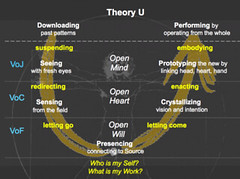Focus--now there's a magic metaphor. Part of me loves legible illusions like the map and chart and the infographic. Insofar as they are of use but only just another filter for meaning I am OK with it, but the institutional demands of schooling always make them something more.<br>
I think that part of the problem is in that magic word focus. If you want to extend the metaphor a bit to the biological realm, as I understand it our brains actually put together more information about visual "reality" from the peripheral. Plus, there is a huge paradox in focusing: our high def , sharp vision occupies 1% of the retinal area but preoccupies 50% of the visual cortex. The paradox being that the fovea is a blindspot because of its acuity. We see yet we do not. Our minds are half occupied with seeing the grand 1% of the sensorium (yeah, I can appreciate the analogy to modern economic life here) Small wonder that the Latin word fovea originally translates as "pit or pitfall". Focus is a pitfall, there for a specific adaptive purpose--to survive on some savannah or woodland or veldt somewhere. But we live in a very different environment now. We need the periphery. Metaphor controls, it is the default until we reprogram it. I think we need to reprogram the 'focus' metaphor.
